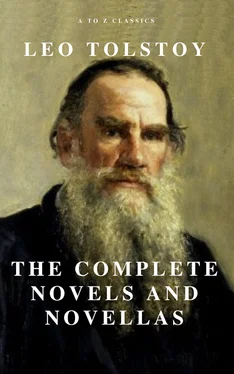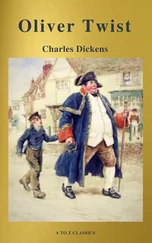Leo Tolstoy - Leo Tolstoy - The Complete Novels and Novellas (Active TOC) (A to Z Classics)
Здесь есть возможность читать онлайн «Leo Tolstoy - Leo Tolstoy - The Complete Novels and Novellas (Active TOC) (A to Z Classics)» — ознакомительный отрывок электронной книги совершенно бесплатно, а после прочтения отрывка купить полную версию. В некоторых случаях можно слушать аудио, скачать через торрент в формате fb2 и присутствует краткое содержание. Жанр: unrecognised, на английском языке. Описание произведения, (предисловие) а так же отзывы посетителей доступны на портале библиотеки ЛибКат.
- Название:Leo Tolstoy: The Complete Novels and Novellas (Active TOC) (A to Z Classics)
- Автор:
- Жанр:
- Год:неизвестен
- ISBN:нет данных
- Рейтинг книги:5 / 5. Голосов: 1
-
Избранное:Добавить в избранное
- Отзывы:
-
Ваша оценка:
- 100
- 1
- 2
- 3
- 4
- 5
Leo Tolstoy: The Complete Novels and Novellas (Active TOC) (A to Z Classics): краткое содержание, описание и аннотация
Предлагаем к чтению аннотацию, описание, краткое содержание или предисловие (зависит от того, что написал сам автор книги «Leo Tolstoy: The Complete Novels and Novellas (Active TOC) (A to Z Classics)»). Если вы не нашли необходимую информацию о книге — напишите в комментариях, мы постараемся отыскать её.
– Childhood
– Boyhood
– Youth
– Family Happiness
– The Cossacks
– War and Peace
– Anna Karenina
– The Death of Ivan Ilyich
– The Kreutzer Sonata
– Resurrection
– The Forged Coupon
– Hadji Murad
Leo Tolstoy: The Complete Novels and Novellas (Active TOC) (A to Z Classics) — читать онлайн ознакомительный отрывок
Ниже представлен текст книги, разбитый по страницам. Система сохранения места последней прочитанной страницы, позволяет с удобством читать онлайн бесплатно книгу «Leo Tolstoy: The Complete Novels and Novellas (Active TOC) (A to Z Classics)», без необходимости каждый раз заново искать на чём Вы остановились. Поставьте закладку, и сможете в любой момент перейти на страницу, на которой закончили чтение.
Интервал:
Закладка:
One of the Cossack wives, a tall, masculine old woman, approaches Granny Ulitka from the homestead opposite and asks her for a light. In her hand she holds a rag.
‘Have you cleared up. Granny?’
‘The girl is lighting the fire. Is it fire you want?’ says Granny Ulitka, proud of being able to oblige her neighbour.
Both women enter the hut, and coarse hands unused to dealing with small articles tremblingly lift the lid of a matchbox, which is a rarity in the Caucasus. The masculine-looking new-comer sits down on the doorstep with the evident intention of having a chat.
‘And is your man at the school. Mother?’ she asked.
‘He’s always teaching the youngsters. Mother. But he writes that he’ll come home for the holidays,’ said the cornet’s wife.
‘Yes, he’s a clever man, one sees; it all comes useful.’
‘Of course it does.’
‘And my Lukashka is at the cordon; they won’t let him come home,’ said the visitor, though the cornet’s wife had known all this long ago. She wanted to talk about her Lukashka whom she had lately fitted out for service in the Cossack regiment, and whom she wished to marry to the cornet’s daughter, Maryanka.
‘So he’s at the cordon?’
‘He is. Mother. He’s not been home since last holidays. The other day I sent him some shirts by Fomushkin. He says he’s all right, and that his superiors are satisfied. He says they are looking out for abreks again. Lukashka is quite happy, he says.’
‘Ah well, thank God,’ said the cornet’s wife.’ “Snatcher” is certainly the only word for him.’ Lukashka was surnamed ‘the Snatcher’ because of his bravery in snatching a boy from a watery grave, and the cornet’s wife alluded to this, wishing in her turn to say something agreeable to Lukashka’s mother.
‘I thank God, Mother, that he’s a good son! He’s a fine fellow, everyone praises him,’ says Lukashka’s mother. ‘All I wish is to get him married; then I could die in peace.’
‘Well, aren’t there plenty of young women in the village?’ answered the cornet’s wife slyly as she carefully replaced the lid of the matchbox with her horny hands.
‘Plenty, Mother, plenty,’ remarked Lukashka’s mother, shaking her head. ‘There’s your girl now, your Maryanka — that’s the sort of girl! You’d have to search through the whole place to find such another!’ The cornet’s wife knows what Lukashka’s mother is after, but though she believes him to be a good Cossack she hangs back: first because she is a cornet’s wife and rich, while Lukashka is the son of a simple Cossack and fatherless, secondly because she does not want to part with her daughter yet, but chiefly because propriety demands it.
‘Well, when Maryanka grows up she’ll be marriageable too,’ she answers soberly and modestly.
‘I’ll send the matchmakers to you — I’ll send them! Only let me get the vineyard done and then we’ll come and make our bows to you,’ says Lukashka’s mother. ‘And we’ll make our bows to Elias Vasilich too.’
‘Elias, indeed!’ says the cornet’s wife proudly. ‘It’s to me you must speak! All in its own good time.’
Lukashka’s mother sees by the stern face of the cornet’s wife that it is not the time to say anything more just now, so she lights her rag with the match and says, rising: ‘Don’t refuse us, think of my words. I’ll go, it is time to light the fire.’
As she crosses the road swinging the burning rag, she meets Maryanka, who bows.
‘Ah, she’s a regular queen, a splendid worker, that girl!’ she thinks, looking at the beautiful maiden. ‘What need for her to grow any more? It’s time she was married and to a good home; married to Lukashka!’
But Granny Ulitka had her own cares and she remained sitting on the threshold thinking hard about something, till the girl called her.
Chapter 6
The male population of the village spend their time on military expeditions and in the cordon — or ‘at their posts’, as the Cossacks say. Towards evening, that same Lukashka the Snatcher, about whom the old women had been talking, was standing on a watch-tower of the Nizhni-Prototsk post situated on the very banks of the Terek. Leaning on the railing of the tower and screwing up his eyes, he looked now far into the distance beyond the Terek, now down at his fellow Cossacks, and occasionally he addressed the latter. The sun was already approaching the snowy range that gleamed white above the fleecy clouds. The clouds undulating at the base of the mountains grew darker and darker. The clearness of evening was noticeable in the air. A sense of freshness came from the woods, though round the post it was still hot. The voices of the talking Cossacks vibrated more sonorously than before. The moving mass of the Terek’s rapid brown waters contrasted more vividly with its motionless banks. The waters were beginning to subside and here and there the wet sands gleamed drab on the banks and in the shallows. The other side of the river, just opposite the cordon, was deserted; only an immense waste of low-growing reeds stretched far away to the very foot of the mountains. On the low bank, a little to one side, could be seen the flat-roofed clay houses and the funnel-shaped chimneys of a Chechen village. The sharp eyes of the Cossack who stood on the watch-tower followed, through the evening smoke of the pro-Russian village, the tiny moving figures of the Chechen women visible in the distance in their red and blue garments.
Although the Cossacks expected abreks to cross over and attack them from the Tartar side at any moment, especially as it was May when the woods by the Terek are so dense that it is difficult to pass through them on foot and the river is shallow enough in places for a horseman to ford it, and despite the fact that a couple of days before a Cossack had arrived with a circular from the commander of the regiment announcing that spies had reported the intention of a party of some eight men to cross the Terek, and ordering special vigilance — no special vigilance was being observed in the cordon. The Cossacks, unarmed and with their horses unsaddled just as if they were at home, spent their time some in fishing, some in drinking, and some in hunting. Only the horse of the man on duty was saddled, and with its feet hobbled was moving about by the brambles near the wood, and only the sentinel had his Circassian coat on and carried a gun and sword. The corporal, a tall thin Cossack with an exceptionally long back and small hands and feet, was sitting on the earth-bank of a hut with his beshmet unbuttoned. On his face was the lazy, bored expression of a superior, and having shut his eyes he dropped his head upon the palm first of one hand and then of the other. An elderly Cossack with a broad greyish-black beard was lying in his shirt, girdled with a black strap, close to the river and gazing lazily at the waves of the Terek as they monotonously foamed and swirled. Others, also overcome by the heat and half naked, were rinsing clothes in the Terek, plaiting a fishing line, or humming tunes as they lay on the hot sand of the river bank. One Cossack, with a thin face much burnt by the sun, lay near the hut evidently dead drunk, by a wall which though it had been in shadow some two hours previously was now exposed to the sun’s fierce slanting rays.
Lukashka, who stood on the watch-tower, was a tall handsome lad about twenty years old and very like his mother. His face and whole build, in spite of the angularity of youth, indicated great strength, both physical and moral. Though he had only lately joined the Cossacks at the front, it was evident from the expression of his face and the calm assurance of his attitude that he had already acquired the somewhat proud and warlike bearing peculiar to Cossacks and to men generally who continually carry arms, and that he felt he was a Cossack and fully knew his own value. His ample Circassian coat was torn in some places, his cap was on the back of his head Chechen fashion, and his leggings had slipped below his knees. His clothing was not rich, but he wore it with that peculiar Cossack foppishness which consists in imitating the Chechen brave. Everything on a real brave is ample, ragged, and neglected, only his weapons are costly. But these ragged clothes and these weapons are belted and worn with a certain air and matched in a certain manner, neither of which can be acquired by everybody and which at once strike the eye of a Cossack or a hillsman. Lukashka had this resemblance to a brave. With his hands folded under his sword, and his eyes nearly closed, he kept looking at the distant Tartar village. Taken separately his features were not beautiful, but anyone who saw his stately carriage and his dark-browed intelligent face would involuntarily say, ‘What a fine fellow!’
Читать дальшеИнтервал:
Закладка:
Похожие книги на «Leo Tolstoy: The Complete Novels and Novellas (Active TOC) (A to Z Classics)»
Представляем Вашему вниманию похожие книги на «Leo Tolstoy: The Complete Novels and Novellas (Active TOC) (A to Z Classics)» списком для выбора. Мы отобрали схожую по названию и смыслу литературу в надежде предоставить читателям больше вариантов отыскать новые, интересные, ещё непрочитанные произведения.
Обсуждение, отзывы о книге «Leo Tolstoy: The Complete Novels and Novellas (Active TOC) (A to Z Classics)» и просто собственные мнения читателей. Оставьте ваши комментарии, напишите, что Вы думаете о произведении, его смысле или главных героях. Укажите что конкретно понравилось, а что нет, и почему Вы так считаете.












